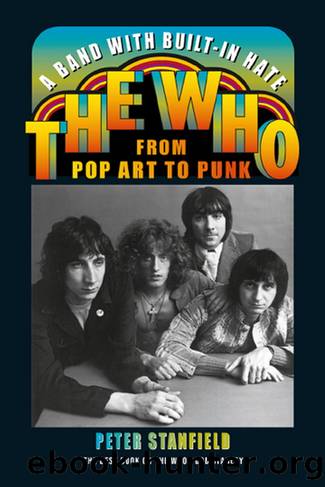A Band With Built-In Hate: The Who From Pop Art to Punk by Peter Stanfield

Author:Peter Stanfield [Stanfield, Peter]
Language: eng
Format: epub
Tags: music, General, Genres & Styles, Rock, art, popular culture
ISBN: 9781789142785
Google: qE0gEAAAQBAJ
Publisher: Reaktion Books
Published: 2021-03-22T23:27:50.014358+00:00
Nik Cohnâs Pop from the Beginning (1969) â here sitting on top of the Track Records compilation The House That Track Built (1969) â used the graphic designer David King, who was partly responsible for half a dozen album covers for Lambert and Stampâs label.
The Beatles absorbed and exploited that summation. Where they led, others followed. And for a while they were truly marvellous. For Cohn, the group went down a dead end when they started to believe in their own hype, when they concurred with âthe posh Sundaysâ that they made Art. In making that turn, pop lost out. Cohn rated Sgt Pepper highly, but he had real issues with what it represented. âIn itself,â he wrote, âit was cool and clever and controlled. Only, it wasnât much like pop. It wasnât fast, flash, sexual, loud, vulgar, monstrous or violent. It made no myths.â15
When The Beatles lived out their lives in a mythical âLiverpool USAâ, they spoke to their teenage audience in the language of pop; âthese boys were coke drinkers from way back,â wrote Cohn. But with Dylan joining them in their Rolls-Royce, The Beatles lost that audience; and they lost a truth that can be found in trash: âoriginally, in the 1950s, the whole point about rock was its honesty, the way it talked so straight after all those years of showbiz blag, and now itâs just become as fake as Tin Pan Alley ever was.â16 Cohn could barely listen to Dylan, he disliked his voice as much as he hated âthe changeless wail of his mouth-harpâ. He thought he was a monotonous âmouthpiece of teen discontent . . . peddling politics and philosophies and social profundities by the pound . . . just the same, [he] moved pop forward into its second phase,â namely, shutting down rock and roll as âthe golden age of pulpâ.17
The Rolling Stones, on the other hand, âwere like creatures from another planet, impossible to reach or understand but most exotic, most beautiful in their uglinessâ.18 The band was made in the likeness of their manager, Andrew Loog Oldham, who âwithout doubt, was the most flash personality that British pop has ever had, the most anarchic and obsessive and imaginative hustler of all. Whenever he was good, he was quite magnificent.â19 The long description he provides of the Stones is Cohn at his best: Watts, âmoronic beyond belief â; Wyman, âimpossibly boredâ; Keith Richards âkept winding and unwinding his legs, moving uglily like a crab, and was shut-in, shuffling, the classic fourth-form drop-out. Simply, he spelled Borstal.â Jones was âflouting and flitting like a gym-slip schoolgirlâ and Jagger, âhe was all sex.â20
After a Liverpool gig by the Stones, pegged by Cohn as the best show he has ever seen, he wanders around the empty auditorium. A dank smell of urine hangs heavy in the air, âthe small girls had screamed too hard and wet themselves.â21 The Stones did things to their audience, they were evil, independent and utterly uncompromising. Every group before
Download
This site does not store any files on its server. We only index and link to content provided by other sites. Please contact the content providers to delete copyright contents if any and email us, we'll remove relevant links or contents immediately.
Kathy Andrews Collection by Kathy Andrews(11812)
The remains of the day by Kazuo Ishiguro(8969)
Paper Towns by Green John(5177)
Spare by Prince Harry The Duke of Sussex(5175)
The Body: A Guide for Occupants by Bill Bryson(5080)
Industrial Automation from Scratch: A hands-on guide to using sensors, actuators, PLCs, HMIs, and SCADA to automate industrial processes by Olushola Akande(5048)
Machine Learning at Scale with H2O by Gregory Keys | David Whiting(4292)
Be in a Treehouse by Pete Nelson(4033)
Never by Ken Follett(3937)
Harry Potter and the Goblet Of Fire by J.K. Rowling(3848)
Goodbye Paradise(3798)
The Remains of the Day by Kazuo Ishiguro(3390)
Into Thin Air by Jon Krakauer(3385)
Fairy Tale by Stephen King(3370)
The Cellar by Natasha Preston(3334)
The Genius of Japanese Carpentry by Azby Brown(3288)
120 Days of Sodom by Marquis de Sade(3261)
Reminders of Him: A Novel by Colleen Hoover(3092)
The Man Who Died Twice by Richard Osman(3072)
